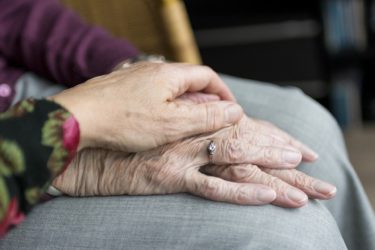Euthanasia. Now there’s a conversation killer. How ironic. Death in general is hard enough to consider. What about a painful death? What about a painful death of someone you love? It’s pretty easy to push those thoughts aside. Or at least, it is until it happens. If you haven’t had the experience of a loved one sinking slowly, inexorably, and unpleasantly towards the unpromised land, then I envy you. Chances are you will at some point though. Sorry.
In the meantime, use your imagination. Let it run wild, and dark, and to the worst possible places, because that’s what we’re dealing with here. The prospect of being able to end needless suffering and hastening the inevitable should be a no-brainer in any caring society. But it’s not. It’s counter intuitive. All those years of evolution have hard coded into us a will to survive, and to maintain the lives of those around us whatever the cost. On the flipside though, we’ve also evolved enough to know when the end is imminent and inevitable. We’ve developed strategies to minimise, and even end the suffering we have to endure. So, the subject of assisted dying rears its controversial head.
Full disclosure. Personally, I’m very much in favour of legally assisted dying. This is very much in line with overwhelming public support for it in the UK. Maybe my own personal experience and biases are clouding my judgment though, so a closer look at the arguments against it is merited.
The primary opponents to this sort of legislation in the UK are an organisation called Care Not Killing. Taking a look through their website, and much more tellingly, a campaign fundraiser email sent to their mailing list, the best summary I can give is: FUD! No, I’m not talking Scottish vernacular here. By FUD I mean Fear, Uncertainty, and Doubt. It is the unholy trinity of maintaining the status quo. All you have to do is inspire enough of any of the three into the minds of the decision makers and your job is done, and it’s doing a pretty good job so far for Care Not Killing.
They do of course have some valid points, and legitimate concerns, but it’s peppered with unsubstantiated claims and misrepresentations. There’s also a heavy reliance on slippery slope arguments that paint expansion of legislation in some countries as part of an inexorable descent towards eugenics, although thankfully we do fall short of Godwin’s law. Here are some examples of where they appear to fall into the realms of inaccuracy:
“The vast majority of UK doctors are opposed to legalising euthanasia”

This is simply not true. The most recent survey carried out by the British Medical Association does show 46% oppose changing the law to allow doctors to administer the drugs, versus 37% who support it. So, there is a majority, but not a vast one. They also fail to mention that the very same survey showed a majority of respondents favour a change in law for doctors to be able to prescribe drugs for patients to self-administer. Yesterday, the BMA voted to drop their opposition to assisted dying legislation.
Elsewhere, The Royal College of Physicians’ most recent poll shows a majority against such legislation, although that majority is decreasing compared to previous polls. It’s been a while since the Royal College of Nursing polled their members, but the most recent one shows a majority in favour of assisted dying legislation. Both organisations have adopted a neutral stance on the subject of assisted dying.
So, the picture is considerably less clear than Care Not Killing would have you believe.
“Inappropriate media portrayal of suicide, assisted suicide and euthanasia will fuel copycat suicides and suicide contagion”
Portrayal of suicide and media coverage of cases may indeed have an impact on suicide rates (more on suicide later). There is some evidence to suggest that the phenomenon is real. However, there is no indication that assisted dying contributes in any way to this. The closest we come to this is a heavily criticised paper from Dr David Jones and Prof. David Paton. Unsurprisingly, the suspicion of religious motivation is apparent with both authors, as they both make numerous appearances in opinion pieces from religious organisations, and are listed as authors on other papers with religious hot-topics such as birth control, abortion, and embryo research.
“Public opinion polls can be easily manipulated when high media profile (and often celebrity-driven) ‘hard cases’ are used to elicit emotional reflex responses without consideration of the strong arguments against legalisation”
This is technically true. The public can indeed be manipulated, however there’s a difference between manipulation, and legitimately exposing some of those ‘hard cases’ to the public in order to provoke rational consideration of how best to deal with such tragic situations. In fact, it’s precisely those ‘hard cases’ that make the strongest case for legalisation.
These stories not only provoke great compassion, but they also prompt us to consider our own mortality, the mortality of those we love, and how we would like to proceed if we become one of those ‘hard cases’. It’s desperate situations like this which drive the aforementioned favour of the public, and no surprise therefore that Care Not Killing are keen to keep a lid on them.
“Data from Oregon USA shows that one of the main reasons why people seek assisted suicide is the fear of being a burden on family, friends or carers”
Technically true, it does make it on the list, but it’s mid-table, sitting way behind loss of autonomy, loss of dignity, and being unable to engage in activities that make life enjoyable.

Even then though, it’s no surprise at all that any caring individual would think like this. Consideration for others, especially the ones you love, is a perfectly natural side effect of not being a psychopath. To be charitable though, it would certainly be a concern if this fear was the only reason that was given by respondents. Fortunately though that appears not to be the case.
It’s clear that there is a myriad of potential reasons why people may opt for assisted dying, but those who do have to provide reasonable justification and jump through many administrative hoops just for the ‘privilege’ to do so. Even then there’s a significant percentage who are prescribed the life ending medicine that ultimately don’t take it, which speaks volumes about both our will to cling on to life, and the desperation of those who ultimately find their predicament unbearable.
“Research also shows that in some jurisdictions where assisted suicide and euthanasia are legal there is a tragic correlation with an increase in SUICIDES among the general population”
Let’s start on this one by repeating the popular skeptical mantra: Correlation does not equal causation. In addition, this particular quote comes from one of their fundraiser emails, which contains notably stronger wording than their website. One might speculate that this is due to the more ‘targeted’ nature of those who may be reading it. The email also mentions that the suicide rate in Oregon, where there has been assisted dying legislation for over two decades, is one third higher than the US national average, and that between 2001 and 2018, there was 33% increase in the general suicide rate the state.
On further inspection, we find that the suicide rate in Oregon is indeed higher than the national average – the same applies to quite a few other states in the union. That’s generally how averages work. Oregon comes tenth in the list of suicide rates in the US. Top of the list is Wyoming – a state which doesn’t have any assisted dying legislation.
Now let’s look at that 33% increase from 2001 to 2018. It’s a somewhat arbitrary timespan selected there. Someone more cynical may assume those years have been cherry-picked to give the highest percentage score, but again that’s mere speculation. What Care Not Killing don’t mention is that during the same time span, the USA as a whole saw an overall increase of 32.7%. This means that Oregon is barely above average along with some other states. Once again, that’s how averages work. There’s no evidence whatsoever that Oregon’s assisted dying legislation plays any factor in those statistics.
Side note: If you compare the annual frequency of Nicholas Cage movies in 2001 to 2018, there has been a 350% increase. Make of that what you will.
Making an informed decision
It certainly appears that Care Not Killing’s strategy of casting fear, uncertainty and doubt is not limited by a compulsion to be honest and accurate.
What about those valid points mentioned earlier though? Issues such as concerns from elderly and disability advocate groups, arguments for improved palliative care, diagnosis and treatment of depression, potential pressure from family, and other even darker topics should not be ignored in any discussion about whether or not to legalise assisted dying.
For a deeper dive into all of these you can delve into an excellent, but difficult to listen to podcast called Better Off Dead from veteran Australian broadcaster Andrew Denton. As well as tackling those thorny issues, it effectively drives home some undeniable facts that opponents to assisted dying struggle to respond to:
- Even with the best of palliative care, there are many cases where people die slowly and painfully.
- Many people out of desperation are taking matters into their own hands and attempting suicide. Some of the methods are brutal, terrifying, and can affect others, like a recent case of a terminally ill man who deliberately stepped in front of a train. Cases like this even prompted former Health Secretary Matt Hancock to request more data on the subject to help inform debates on assisted dying.
- In the UK we currently live in a two tier society where people with the financial means to travel abroad to countries where assisted dying is legal can take control of how they die in the most desperate of situations, and those without those means simply have to roll the dice and hope that their suffering is not too great.
So, if you’re making a decision on how you feel about the subject, I would of course encourage you to apply your critical thinking skills, and carefully evaluate the arguments for and against. I’d also encourage you to use some empathy though; put yourselves in the shoes of those who have had to suffer the worst of deaths, or perhaps those of the loved ones who watched on helplessly. What would you want if it was you in that position, or someone you loved? There’s a time for being dispassionate, and this isn’t it.



